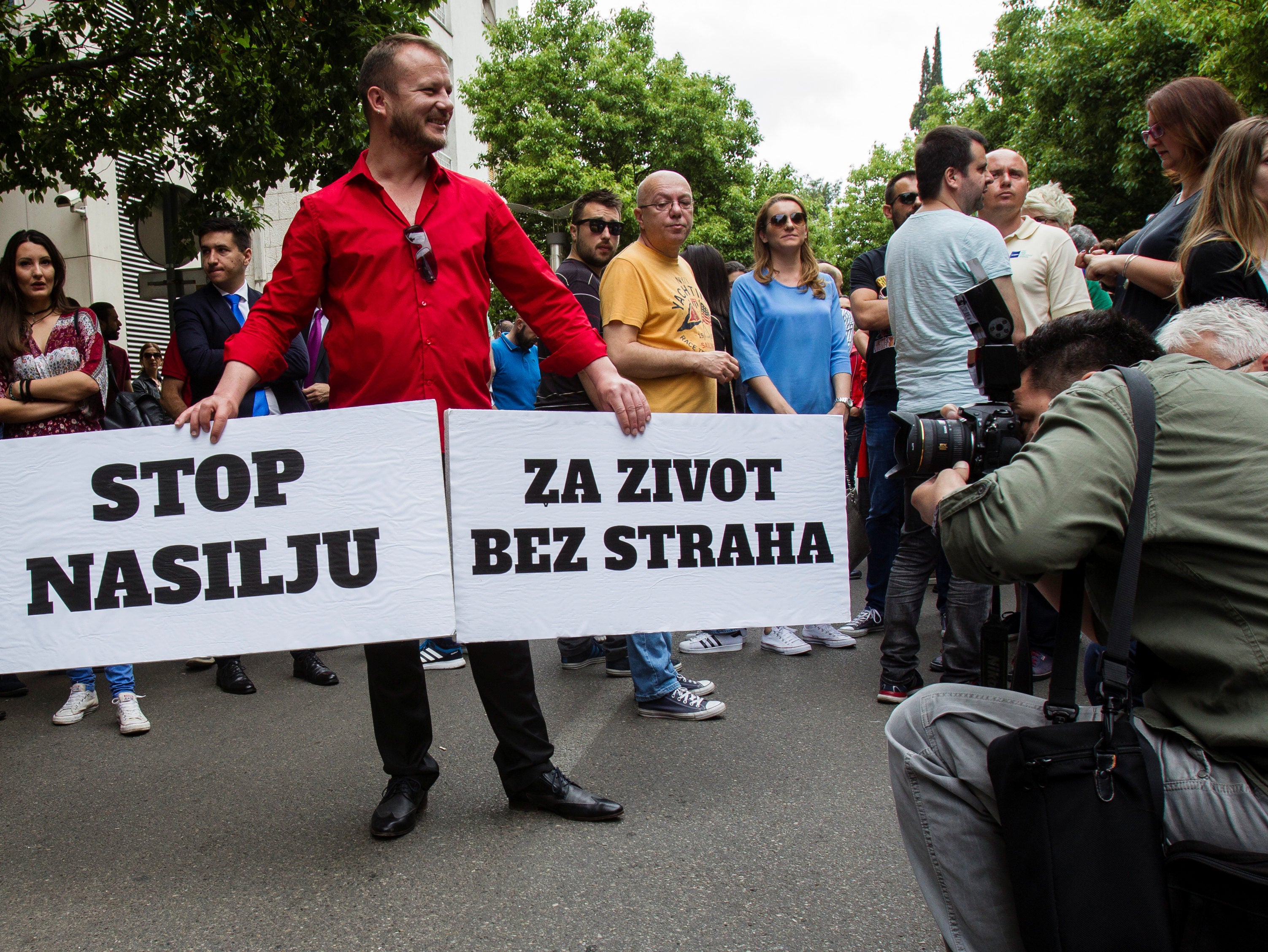
Hundreds of people have gathered outside the government building in the Montenegro capital to protest a spate of recent attacks on journalists in the country and demand authorities do more to investigate.
Protestors held signs that read “stop violence” and “for a life without fear” as part of the protests held yesterday (pictured).
The latest victim, Olivera Lakic, 49, works for the daily newspaper Vijesti. She was shot in the leg by an unknown assailant outside her home in Podgorica on 8 May and is currently being treated in hospital.
Participants in the protests included Lakic’s colleagues at Vijesti, opposition politicians, civil society leaders and journalists from other media outlets.
Srdan Kosovic, editor of Vijesti, told Press Gazette that the latest shooting marks the 25th attack on journalists and their properties, including an unsuccessful attempt to kill a journalist from TV Vijesti with a car bomb.
Kosovic said: “Vijesti journalists are being targeted because they write about organised crime, corruption and other major issues in Montenegro.
“Being a rare independent media in the country, Vijesti do not serve the interests of political and economical powerhouses, but are reporting objectively and are a beacon of investigative journalism in Montenegro.
“Lakic is being most likely targeted because of her investigative work related to smuggling of cigarettes and tobacco.”
Kosovic believes that, in order to prevent further attacks, the state and the government must “make an effort to resolve all the cases of attacks on journalists, especially to find those who ordered the attacks”.
He said “political figures and other leaders need to stop targeting journalists”, adding: “There is pattern with inflammatory statements from our president-elect which legitimise the attacks on journalists, and then there is a blanket impunity for everyone involved in those attacks.”
The Montenegrin media trade union, Sindikat Medija, said in a press release: “It is clear that the attackers, with this dishonourable shot, wanted to send her [Lakic] a message to stop reporting on suspicious and criminal affairs, which she has been doing for years.”
They added: “If this case remains unsolved, journalists must seriously consider alternative ways to defend their lives and professional integrity. Montenegro must not become a synonym for a place where the free word is threatened by bullets.”
Montenegro was ranked at 103 of 180 countries in the 2018 World Press Freedom Index, compiled by campaign group Reporters Without Borders.
Tom Gibson, the Committee for the Protection of Journalist’s European Union representative, told Press Gazette: “The shooting is the second attack on a journalist this year.
“It raises serious concerns about the direction of press freedom in Montenegro, especially for investigative journalists.”
Montenegro has applied to join the EU, but has yet to become a member.
Gibson added: “EU institutions know how bad the situation is getting for journalists in the country. Media freedom and the safety of journalists should remain a sticking point during future EU accession negotiations.”
Council of Europe secretary general Thorbjorn Jagland said in a statement: “I was shocked and saddened by the news of yet another attack on a journalist, in Montenegro.”
He added: “The work of journalists and free media are essential to the functioning of any democracy. Attacks on journalists are therefore also an attack on democracy.
“Unfortunately, such attacks are on the rise. This is a key concern for the Council of Europe and we must do all we can to stop this dangerous trend.”
There have been a number of attacks on journalists in recent weeks, including a bombing in Kabul, Afghanistan, that killed nine journalists. A BBC Afghan reporter was also shot in a separate incident the same day.
She had exposed Malta’s links to offshore tax havens through the leaked Panama Papers and investigated political corruption in the island nation.
Picture: Reuters/Stevo Vasiljevic
Email pged@pressgazette.co.uk to point out mistakes, provide story tips or send in a letter for publication on our "Letters Page" blog
